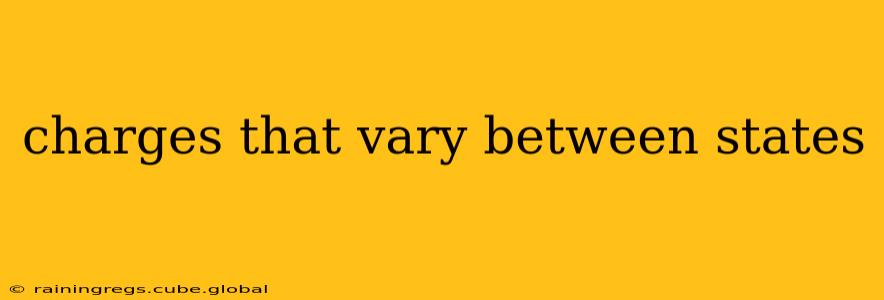Many fees and charges vary significantly from state to state within the United States. This inconsistency stems from differing state laws, regulations, tax structures, and economic conditions. Understanding these variations is crucial for businesses, consumers, and anyone navigating the complexities of interstate commerce or relocation. This guide explores several key areas where state-to-state charges differ significantly.
What Types of Charges Vary Between States?
Several categories of charges exhibit considerable variation across states. These include, but are not limited to:
-
Sales Tax: This is perhaps the most well-known example. Sales tax rates differ dramatically depending on the state and even the locality within a state. Some states have no sales tax at all, while others have rates exceeding 10%. Understanding the applicable sales tax is crucial for both businesses (calculating prices and collecting taxes) and consumers (budgeting for purchases).
-
Property Tax: Property taxes, levied on real estate and other assets, vary considerably based on property value, local government spending, and assessment methods. High-property-value areas often have higher tax rates, but even within similar areas, variations exist due to different assessment practices. This is a significant factor for homeowners and property investors.
-
Income Tax: State income taxes differ significantly, with some states having no income tax whatsoever. Even among states with income taxes, rates and brackets vary, influencing the amount of tax owed based on income level. This is a major consideration when comparing the cost of living in different states and making financial decisions.
-
Vehicle Registration Fees: The cost to register a vehicle varies greatly depending on the state, the type of vehicle, and its age. Some states charge flat fees, while others base registration costs on the vehicle's value or age. Understanding these fees is crucial for anyone buying or registering a car in a new state.
-
Professional Licensing Fees: The cost of obtaining professional licenses (doctors, lawyers, contractors, etc.) varies considerably across states. These fees can be significant and are often a factor in determining where professionals choose to practice.
-
Business Licenses and Fees: Starting and operating a business involves various licenses and fees that change from state to state. These include general business licenses, permits for specific industries, and other regulatory fees. Understanding these costs is essential for entrepreneurs considering different states for their business ventures.
Why Do Charges Vary Between States?
The disparity in charges across states stems from several key factors:
-
State Budgets and Revenue Needs: States have different levels of government spending and revenue needs. States with higher public spending may rely more on taxes or fees to generate revenue, resulting in higher charges.
-
State Laws and Regulations: Different state laws and regulations impact various charges. For instance, states with stricter environmental regulations may impose higher fees on businesses related to environmental compliance.
-
Economic Conditions: States with robust economies may have the capacity to offer lower tax rates or fees, while states with weaker economies may need to rely more on taxes and fees to fund essential services.
-
Political Priorities: The political climate and priorities of each state significantly influence the types and levels of charges imposed.
How to Find Specific Charges for Your State?
To find the specific charges applicable to your state, several resources can be helpful:
-
State Government Websites: The official website of your state government typically contains information about taxes, fees, and other charges.
-
State Tax Departments: Contact your state's tax department directly for information on sales, property, and income taxes.
-
Professional Licensing Boards: For professional licensing fees, contact the relevant state licensing board.
Understanding the variations in charges across states is critical for informed decision-making in various aspects of life. Whether you're a business owner, consumer, or planning a move, researching these variations is essential for successful navigation of the complex financial landscape across the United States.
